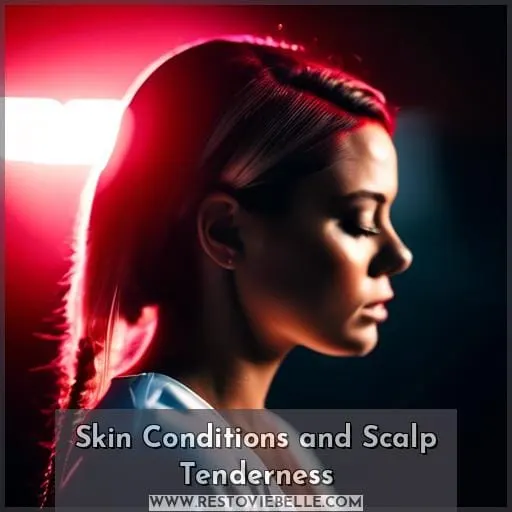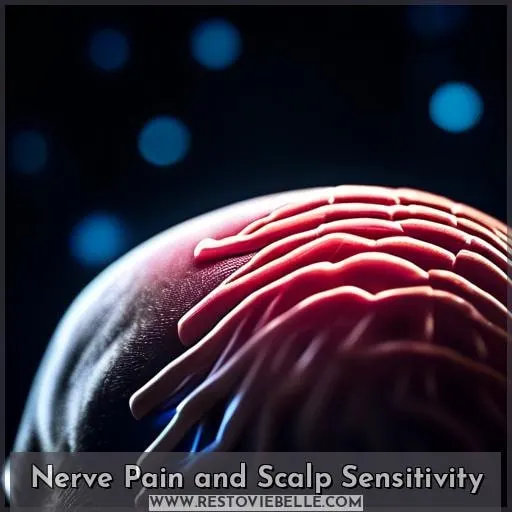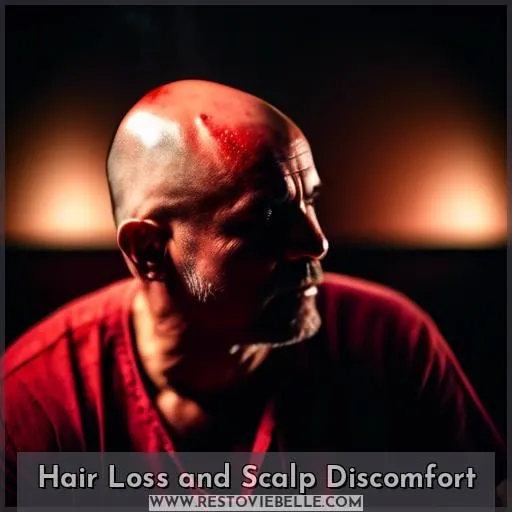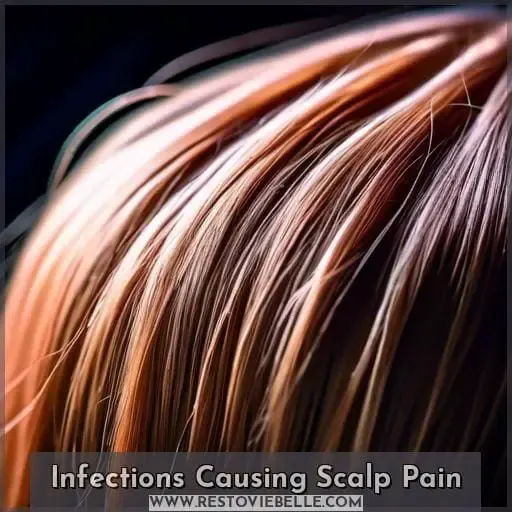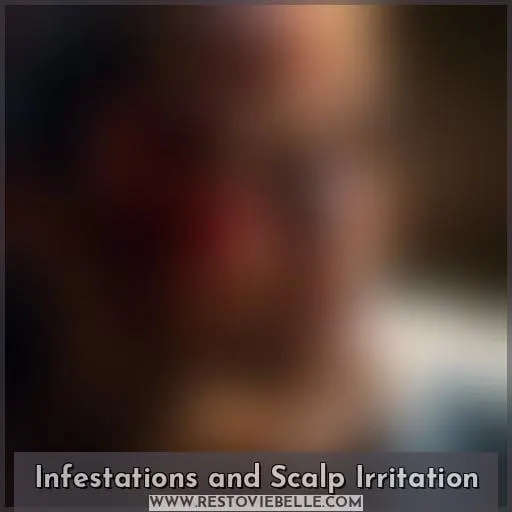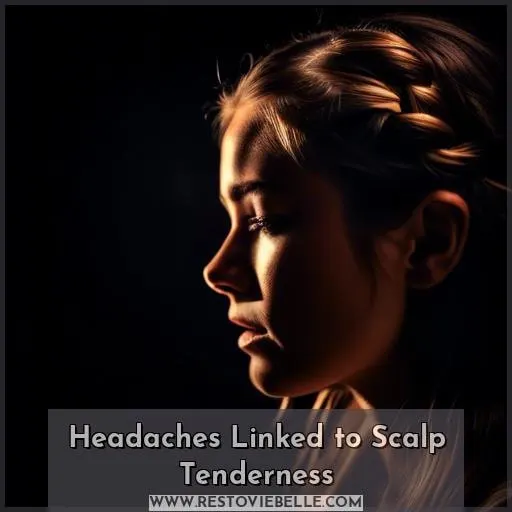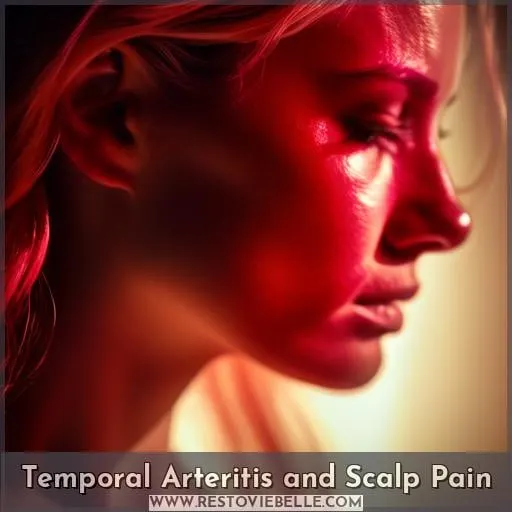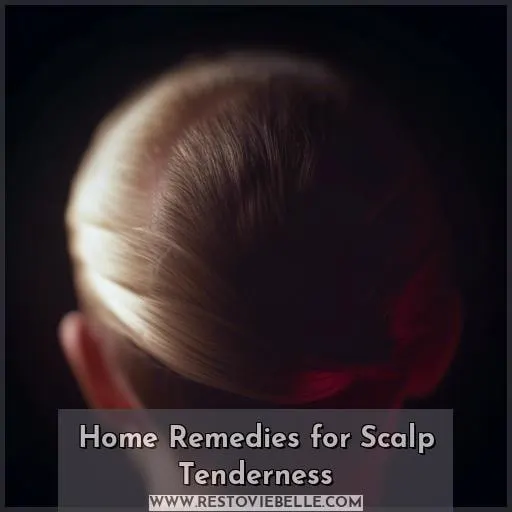This site is supported by our readers. We may earn a commission, at no cost to you, if you purchase through links.
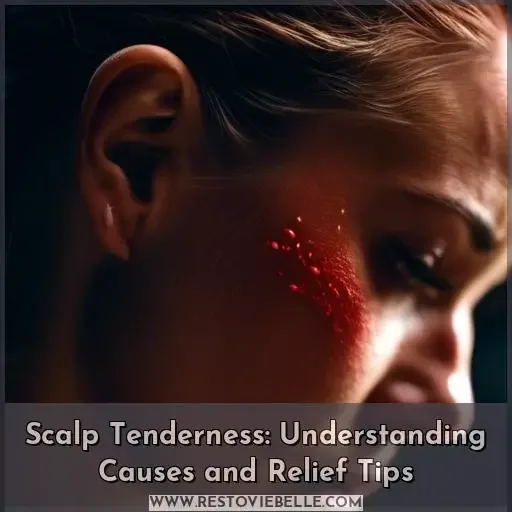 Imagine the relief of understanding why your scalp feels tender and knowing how to soothe it.
Imagine the relief of understanding why your scalp feels tender and knowing how to soothe it.
Scalp tenderness can stem from various causes, ranging from skin conditions to nerve pain.
Whether it’s the discomfort of a tight hairstyle or the sting of an insect bite, you’re not alone in seeking comfort.
This guide will navigate you through the complexities of scalp health, offering insights into causes and tips for relief, empowering you with knowledge and control over your well-being.
Table Of Contents
- Key Takeaways
- Skin Conditions and Scalp Tenderness
- Nerve Pain and Scalp Sensitivity
- Hair Loss and Scalp Discomfort
- Infections Causing Scalp Pain
- Infestations and Scalp Irritation
- Headaches Linked to Scalp Tenderness
- Temporal Arteritis and Scalp Pain
- Other Factors Affecting Scalp Health
- Home Remedies for Scalp Tenderness
- When to Seek Medical Advice
- Frequently Asked Questions (FAQs)
- Conclusion
Key Takeaways
- Scalp tenderness can be caused by a variety of conditions ranging from skin disorders like eczema and psoriasis, to infections such as folliculitis, and even infestations like head lice.
- Common symptoms of scalp tenderness include pain, inflammation, itching, and sensitivity to touch, which can be exacerbated by environmental factors like sun exposure and stress.
- Treatment options vary depending on the underlying cause but may include medicated shampoos, creams, or ointments, as well as home remedies like scalp massages and applying cold or heat packs.
- Preventative measures to avoid scalp tenderness include using gentle hair care products, avoiding tight hairstyles, and protecting the scalp from extreme weather conditions.
Skin Conditions and Scalp Tenderness
If you’re experiencing scalp tenderness, it’s important to consider skin conditions such as psoriasis, sunburn, insect bites, and rashes as potential culprits. These issues can lead to inflammation and discomfort, manifesting in symptoms like pain, itching, and flaking of the scalp.
It’s essential to identify the underlying cause to determine the appropriate treatment and alleviate your symptoms effectively.
Rashes
Rashes can be a real pain in the scalp, literally! They sneak up on you like uninvited guests, causing all sorts of havoc.
From the annoying itch of eczema to the fiery sting of contact dermatitis, your scalp can feel like it’s hosting a never-ending party of irritants. And let’s not forget the uninvited plus-ones: folliculitis and dandruff, crashing the scene with their own brand of irritation.
Sunburn decides to turn up the heat, making your scalp a no-go zone for even the gentlest touch. Psoriasis and lichen planus are the guests who overstay their welcome, leaving behind a trail of flakiness and discomfort.
But fear not, with the right care, you can show these party poopers the door and reclaim your scalp’s comfort.
Sunburn
As you’ve just learned about rashes, it’s crucial to understand that sunburn can also contribute to scalp tenderness. Sunburn is essentially your skin’s response to excessive UV exposure, leading to inflammation and discomfort.
- Sun Exposure: Prolonged sun exposure without adequate protection can lead to sunburn, causing scalp soreness and skin damage.
- UV Protection: To prevent sunburn, use hats or products with UV protection when outdoors, especially during peak sun hours.
- Aloe Vera: For sunburn relief, aloe vera is a go-to remedy due to its cooling and healing properties, which can also help with a dry scalp.
- Hair Loss and Dandruff: Severe sunburns can exacerbate hair loss and dandruff, so it’s important to protect your scalp just as you’d your skin.
Insect Bites
Insect bites on the scalp can be a real buzzkill, causing not just the classic itchy red bumps but also scalp tenderness and inflammation.
If you’re scratching your head wondering why it feels like a bug’s playground, remember that these tiny critters can trigger allergic reactions and even hair loss in severe cases.
So, next time you’re out and about, it might be wise to keep your hair tied up and your scalp shielded from those pesky insect critters.
Psoriasis
If you’re grappling with psoriasis on your scalp, you’re dealing with more than just redness and flakiness. This pesky condition can make your scalp feel like it’s on fire, with a tingling sensation that’s enough to make you want to scratch your head off.
But before you do, remember that rough treatment can actually worsen the situation.
When it comes to treatment, you’ve got options that go beyond the standard shampoo and cream routine. Your dermatologist might suggest something more high-tech, like light therapy, or even systemic medications if your scalp is staging a full-on rebellion.
So, keep your hat on (figuratively, of course) and know that with the right approach, you can keep your scalp’s temper in check.
Nerve Pain and Scalp Sensitivity
If you’re grappling with nerve pain and scalp sensitivity, particularly symptoms akin to occipital neuralgia, it’s crucial to understand the underlying causes and explore effective relief strategies.
Occipital neuralgia can manifest as a sharp, shooting, or throbbing pain that originates at the base of the skull and can radiate through the head, neck, and scalp, making even light touches painfully unbearable.
Addressing this condition might involve a combination of medication, such as gabapentin or pregabalin, and non-medicine treatments like physical therapy or relaxation techniques, tailored to alleviate your specific symptoms and improve your quality of life.
Occipital Neuralgia Symptoms
Moving from skin conditions that can cause scalp tenderness, let’s delve into the nerve-related issue of occipital neuralgia.
- A headache that feels like an electric shock coursing through your head, neck, and back.
- Scalp sensitivity so acute that even a gentle breeze might feel like a hammer blow.
- Numbness that creeps across your scalp like an unwelcome shadow.
- Pain radiating with such intensity it can turn the simple act of turning your head into a daunting ordeal.
Occipital neuralgia is often the result of an injury or a pinched nerve, and it’s a pain, quite literally, that you shouldn’t ignore. If you’re grappling with these symptoms, it’s time to seek advanced treatment options that can offer relief and restore your sense of safety and control.
Scalp Sensitivity to Touch
If you’re grappling with scalp sensitivity to touch, it’s a sign that your nerves are on high alert. This could be a whisper from your body hinting at occipital neuralgia, where the nerve’s usual hum turns into a painful roar through your head, neck, and scalp.
Imagine your scalp turning into a no-touch zone, where even a gentle breeze might feel like a sledgehammer. It’s not just about the physical pain; it’s a cocktail of stress, anxiety, and sometimes even depression that adds to the mix.
Hormonal shifts can also play a role, so if you’re feeling like your head’s in a vice during that time of the month, you’re not alone. Sun exposure can be a double-edged sword too, sometimes soothing, other times stinging like a battalion of bees.
And let’s not forget the sneaky culprits like alopecia areata or the heavyweight champ of headaches, giant cell arteritis. It’s a complex battlefield, where autoimmune disorders can also join the fray, leaving your scalp feeling like it’s under siege.
Hair Loss and Scalp Discomfort
If you’re grappling with hair loss or scalp discomfort, understanding the underlying causes is crucial.
Telogen effluvium, various forms of alopecia, and cicatricial alopecia are key conditions that can lead to these symptoms. Each has distinct characteristics and potential treatments, emphasizing the importance of accurate diagnosis and tailored management strategies.
Telogen Effluvium
Moving from the throbbing woes of occipital neuralgia, let’s dive into the stormy seas of telogen effluvium.
Imagine your scalp as a garden where stress, akin to a harsh winter, forces hair into hibernation, only to shed like autumn leaves. This temporary hair loss, triggered by emotional roller coasters or hormonal tidal waves, often resolves itself.
But when your mane starts thinning, it’s not just about vanity; it’s a barometer of inner turmoil. Age and tension headaches might just be the gusts that shake loose those tresses.
So, while you’re waiting for your hair’s spring revival, keep your chin up and remember, this too shall pass.
Alopecia Variants
Moving from the temporary shedding of telogen effluvium, let’s dive into the world of alopecia variants, where the landscape of hair loss takes on new, often more permanent forms.
- Alopecia Areata: This autoimmune condition ambushes your hair in patches, leaving smooth, bald islands in a sea of hair.
- Alopecia Totalis: Imagine a sudden coup where all scalp hair abandons ship, leaving behind a smooth, barren landscape.
- Alopecia Universalis: A more radical rebellion where hair from the entire body declares independence, leaving no strand behind.
- Centrifugal Cicatricial Alopecia: This condition slowly expands its territory from the top, scarring as it conquers, making regrowth a battle lost.
Navigating these conditions requires a blend of medical expertise and sometimes, a touch of creativity—think essential oils for a soothing scalp or avoiding harsh chemicals that wage war on your hair follicles.
Remember, while the journey through alopecia variants can be unpredictable, you’re not navigating these choppy waters alone.
Cicatricial Alopecia
Moving from discussing various forms of alopecia, let’s dive into the world of Cicatricial Alopecia, a condition that’s as complex as it sounds. Imagine your scalp turning into a battlefield, where inflammation and autoimmune diseases are the invaders, leading to the destruction of your hair’s command centers – the follicles.
This isn’t your typical hair loss story; it’s a tale of irreversible damage where once hair falls, it’s a no-return journey.
| Before | After |
|---|---|
| Lush Hair | Barren Lands |
| Happy Follicles | Collagen Overload |
| Hair Parties | Folliculitis Aftermath |
Cicatricial Alopecia, or scarring alopecia, is like the villain in hair tales, causing permanent hair loss through the destruction of hair follicles, replaced by scar tissue. It’s a sneak attack – sometimes due to skin injuries or burns, other times it’s an inside job by autoimmune disorders.
The aftermath? A landscape where hair refuses to grow, leaving behind smooth, shiny patches of nothingness.
But don’t lose hope just yet. While the condition is permanent, early detection and treatment can put a halt to the advancing enemy lines, preserving the territory you still have. It’s a reminder that in the battle for hair, knowledge, and timely action are your best allies.
Infections Causing Scalp Pain
Infections like tinea capitis and scalp folliculitis are common culprits behind scalp pain and discomfort.
Tinea capitis, a fungal infection, often presents as itchy, scaly patches that can lead to hair loss. This condition requires medical attention for effective management, with treatments ranging from oral antifungals.
Scalp folliculitis, an inflammation of the hair follicles, causes itchy, painful pustules. This condition also requires medical attention for effective management, with treatments including medicated shampoos and antibiotics.
Tinea Capitis
Tinea Capitis, commonly known as scalp ringworm, is a pesky fungal infection that can turn your scalp into a flaky, itchy battleground.
- Ringworm doesn’t mean a worm is having a field day up there; it’s actually a fungus causing the trouble.
- Dandruff lookalike flakes? Could be tinea capitis masquerading as your regular flaky foe.
- Baldness alert! This uninvited guest can lead to hair loss, leaving behind bald patches.
- Itching that just won’t quit? Yep, that’s another sign that this fungal fiend might be to blame.
Don’t just sit there scratching your head—treatment typically involves oral antifungal medications, because those over-the-counter products mightn’t cut it. And remember, an oily scalp can be like a welcome mat for this infection, so keep it clean with medicated washes.
Folliculitis
Moving from the itchy annoyance of tinea capitis, let’s dive into another irksome condition: folliculitis. Imagine your scalp’s tiny hair mansions getting gate-crashed by bacteria or fungi, leading to a bash of red, inflamed bumps.
These uninvited guests can cause quite the painful party on your head. Folliculitis symptoms include tender, itchy skin that might make you feel like your scalp’s throwing a tantrum. But don’t fret; folliculitis home remedies can be your bouncers, showing these pesky intruders the door.
Keep your hair tools like dryers and flat irons on a low heat setting to avoid further irritation. And if your scalp’s sensitivity is through the roof, it might be time to give your doc a ring for some folliculitis treatment that packs a punch.
Infestations and Scalp Irritation
If you’re experiencing scalp tenderness, it’s important to consider infestations such as head lice and scabies as potential causes.
These conditions aren’t only uncomfortable but can also lead to further complications if not treated properly.
It’s essential to identify and manage these infestations promptly with appropriate medical interventions to alleviate symptoms and prevent spread.
Head Lice
Moving from the itch and irritation of infections like tinea capitis and folliculitis, let’s scratch the surface of another common culprit behind scalp tenderness: head lice. These tiny freeloaders can turn your scalp into their personal playground, causing quite the nuisance.
- Head lice symptoms: Itchy scalp, feeling like something’s moving in your hair.
- Head lice treatment: Over-the-counter shampoos or prescription medications.
- Head lice prevention: Avoid head-to-head contact and sharing personal items like combs.
- Head lice eggs: Also known as nits, these are stubbornly glued to hair shafts.
- Home remedies: While not always clinically proven, some swear by wet combing or essential oils mixed with a carrier oil like sweet almond oil.
Scabies
Scabies infestation on the scalp can cause intense itching, rash, and blisters. These mites burrow into the skin, leading to discomfort.
Treatment involves medicated creams to kill the mites. In severe cases, oral medications may be necessary.
Scabies can worsen with a weakened immune system or family history of infestations. The condition results from viral diseases and can lead to the narrowing of blood vessels.
Headaches Linked to Scalp Tenderness
Headaches, particularly tension headaches and migraines, can often be linked to scalp tenderness, a condition that can significantly affect your quality of life.
If you’re experiencing a tight, pressing pain in your head, neck, or scalp, or if your scalp feels tender or prickly during a migraine, you’re encountering common symptoms associated with these headache types.
These conditions aren’t just painful but can also lead to a hypersensitivity to stimuli, making even a light touch feel unbearable.
Understanding these connections is crucial for managing your symptoms and seeking appropriate treatment options.
Tension Headaches
When it feels like there’s a vice squeezing your head, you’re likely dealing with tension headaches.
- Your scalp becomes so sensitive that even a gentle brush feels like sandpaper.
- The triggers? Stress, tight ponytails, or that hat you swore was just snug, not tight.
- Relief comes in forms you mightn’t expect: ditching the hat, easing up on the hair ties, and maybe a cold pack for good measure.
It’s not just about popping a pill; it’s about understanding the why and how. From stress reduction techniques to avoiding those tight hairstyles, managing tension headaches is about tuning into your body’s signals.
Remember, your head’s not just a place to hang your hat—it’s a barometer for your well-being.
Migraines
Migraines, those head-throbbing guests that overstay their welcome, can make your scalp feel like a battleground. They’re not just headaches; they’re your body’s way of hitting the panic button.
| Migraine Triggers | Medication Options | Home Remedies |
|---|---|---|
| Stress | Corticosteroid medications | Scalp massages |
| Hormonal changes | Preventive drugs | Cold packs |
| Certain foods | Pain relievers | Relaxation techniques |
| Sleep disturbances | Limiting screen time | |
| Weather changes | Hydration |
Temporal Arteritis and Scalp Pain
Temporal arteritis is a condition that can cause scalp pain by inflaming the arteries around the temples. This inflammation can lead to a variety of symptoms, including cranial tenderness, a sneaky fever, and an elevated sedimentation rate indicating inflammation in the body.
The headache associated with temporal arteritis is not your typical headache; it’s a relentless pounding that can make even simple tasks like brushing your hair challenging. Carotidynia, where the carotid artery also feels strained, adds to the overall discomfort experienced by individuals with this condition.
Imagine your scalp throwing a tantrum, inflamed and sensitive, making even a gentle breeze feel like a storm. This sensitivity can turn everyday activities into daring feats, highlighting the impact of temporal arteritis on daily life.
Environmental factors can exacerbate symptoms, turning a serene environment into a battleground for those dealing with this condition.
Navigating temporal arteritis requires seeking medical advice to ensure a smoother journey ahead. It’s essential to address the symptoms and manage the inflammation to improve quality of life for individuals grappling with this challenging condition.
Other Factors Affecting Scalp Health
When it comes to maintaining the health of your scalp, it’s crucial to be aware of the impact of tight hairstyles and allergic reactions.
Tight hairstyles, such as ponytails, braids, and buns, can lead to traction alopecia, a form of hair loss caused by constant pulling on the hair roots.
Additionally, allergic reactions to products like hair dye can cause symptoms ranging from mild irritation to severe swelling and discomfort.
It’s important to adopt gentler hair care practices and be mindful of potential allergens to prevent these issues.
Tight Hairstyles
Tight hairstyles, like your go-to sleek ponytail or those chic cornrows, might be doing more than just turning heads—they could be turning your hairline back! Ever heard of traction alopecia? It’s the fancy term for hair loss caused by the constant pull on your roots.
Imagine your hair follicles throwing a white flag, begging for a little slack. And if you’re thinking, No pain, no gain, well, in this case, the gain might just be a wider forehead. So, next time you’re aiming for that tight updo, maybe let those locks breathe a bit.
Your scalp will thank you, and honestly, a little looseness never hurt anyone’s style.
Plus, who wants to be the poster child for beauty is pain when you can rock a healthy mane and still slay?
Allergic Reactions
Allergic reactions on the scalp can be a real pain in the neck—or, more accurately, a pain on the top of your head! If you’ve ever found yourself scratching your head, not just in confusion but because of an itchy allergic scalp rash, you’re not alone.
- Allergic reactions can turn your scalp into a battleground, with contact dermatitis leading the charge. This pesky condition doesn’t play favorites; it can flare up from a variety of triggers, including hair products or even the very air in different geographic regions.
- Scalp eczema is another culprit, often leaving its mark with symptoms like redness, dryness, and that all-too-familiar itch. Whether it’s seborrheic dermatitis making your scalp its home or another form of eczema, the struggle is real.
- Don’t forget about the sneaky allergens lurking in everyday items. From the shampoo in your shower to the dye in your hair, these substances can kickstart an allergic reaction faster than you can say itchy scalp.
Home Remedies for Scalp Tenderness
When dealing with scalp tenderness, you have several home remedies at your disposal that can offer relief. Massaging your scalp gently with your fingertips in circular motions can help alleviate discomfort by improving blood circulation.
Applying cold or heat packs to the affected area for about 10 minutes at a time can also be beneficial, depending on whether the tenderness is accompanied by inflammation or muscle tension.
Additionally, if your hair has been tied up tightly, gradually releasing it can help ease the tension on your scalp. These methods are simple yet effective ways to manage mild scalp tenderness at home.
Scalp Massaging Techniques
Continuing from the discussion on factors that can affect scalp health, let’s delve into the art of scalp massaging—a true ally in your quest for relief.
Picture this: your fingertips are dancers, gracefully waltzing across your scalp, easing tension with every step. This isn’t just a dance for relaxation; it’s a strategic move for root stimulation, paving the way for healthy hair growth.
Think of it as a stress reduction ritual, where each gentle knead and stroke is a whisper of comfort to your weary scalp. And while you’re at it, why not throw in some relaxation techniques? A little warmth from a heat pack or the cool caress of an ice pack can work wonders.
So, take a moment, breathe deep, and let your hands work their magic—your scalp will thank you.
Cold or Heat Packs
When dealing with scalp tenderness, cold or heat packs can be a real lifesaver. Here’s how you can use them to your advantage:
- Cold Packs: Chill out those inflamed areas. A cold pack can numb the pain and reduce swelling, especially after a day in the sun or an allergic reaction.
- Heat Packs: Warm up to comfort. Applying heat can soothe the scalp, easing tension from stress or hormonal changes.
- Alternating Therapy: Mix it up for maximum relief. Alternating between cold and heat can help with various types of scalp damage, providing a one-two punch against discomfort.
When to Seek Medical Advice
If you’re experiencing persistent scalp pain and tenderness alongside hair loss, or if your symptoms are severe and don’t improve with home remedies, it’s crucial to seek medical advice.
A healthcare professional can offer specialized experience and advanced treatment options tailored to your specific condition. They’ll assess your symptoms, possibly perform tests, and recommend the most effective treatment plan for you.
Persistent Scalp Pain
If you’re grappling with persistent scalp pain, it’s crucial to recognize when it’s time to seek medical advice. While home remedies can offer temporary relief, certain symptoms signal the need for professional evaluation.
| Symptom | Action |
|---|---|
| Scalp cysts or lumps | Consult a healthcare provider |
| Signs of skin cells or hair follicles infection (redness, pain, pus) | Seek medical attention |
| Severe acne or allergic reactions not improving with home care | Visit a dermatologist |
Persistent discomfort or changes in your scalp’s health could indicate underlying conditions that require advanced treatment options. Don’t hesitate to reach out to a specialist if you’re experiencing ongoing issues, as they can provide the expertise needed for proper diagnosis and management.
Scalp Tenderness With Hair Loss
If you’re grappling with scalp tenderness accompanied by hair loss, it’s time to play detective with your health. This dynamic duo of symptoms could be the body’s SOS signal, hinting at underlying issues like autoimmune disease, hormonal imbalances, or nutritional and vitamin deficiencies.
Stress can also be a sneaky culprit, often exacerbating related conditions. So, if your mane is thinning faster than your patience, it’s wise to consult a healthcare professional. They can help unravel the mystery and steer you towards a treatment plan that could restore not just your hair, but also your peace of mind.
Frequently Asked Questions (FAQs)
Can dietary changes alleviate scalp tenderness?
Dietary changes can indeed help alleviate scalp tenderness by reducing inflammation and providing essential nutrients for skin health.
Consider anti-inflammatory foods like fatty fish.
Avoid high-mercury fish and sugar.
Is there a genetic predisposition to experiencing scalp tenderness?
Yes, there’s a genetic predisposition to experiencing scalp tenderness.
Your scalp’s sensitivity isn’t just about the shampoo you use or the hat you wear; your genes play a role too.
Just like inheriting your grandma’s piercing blue eyes or your dad’s knack for storytelling, sensitive skin, including that of your scalp, can be passed down through families.
So, if your scalp throws a fit at the slightest provocation, you might have your ancestors to thank for that extra sensitive touch.
How does mental health affect scalp tenderness?
Mental health can influence scalp tenderness. Stress, anxiety, or depression may trigger or worsen symptoms like burning or stinging sensations.
It’s like your brain’s sending SOS signals right to your scalp!
Can scalp tenderness be a symptom of an underlying systemic disease?
Yes, scalp tenderness can indeed signal an underlying systemic disease. Like a canary in a coal mine, your scalp might be the first to raise the alarm, hinting at deeper health battles ranging from autoimmune disorders to systemic infections.
It’s a reminder that sometimes, the root of the problem lies far beneath the surface.
What role does the microbiome of the scalp play in scalp tenderness?
Your scalp’s microbiome, a bustling metropolis of microbes, plays defense against irritants that can make your head feel like a tender thorn bush.
It’s a delicate balance—tip it, and discomfort may bloom.
Conclusion
Nearly half of the population experiences scalp sensitivity, with a French study revealing a staggering 44.2% affected. This statistic underscores the widespread nature of scalp tenderness, a condition that can stem from a variety of causes, including skin conditions, nerve pain, infections, and even certain hairstyles.
Understanding the root cause of your scalp tenderness is crucial for finding relief. Whether it’s adjusting your hair care routine to avoid tight hairstyles and harsh chemicals, or seeking medical advice for underlying conditions like psoriasis or temporal arteritis, there are steps you can take to alleviate discomfort.

